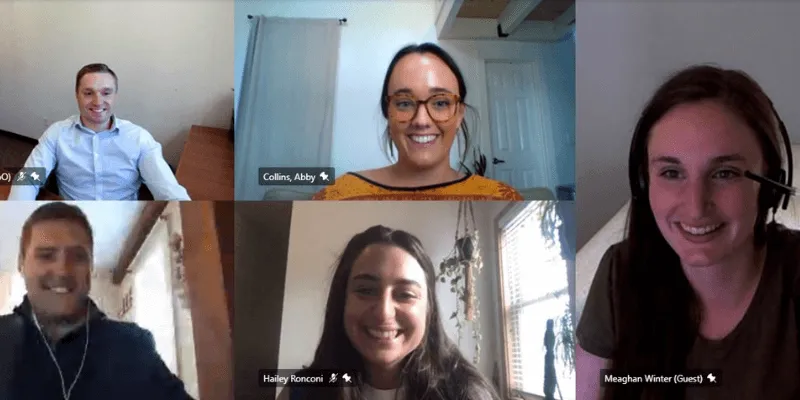No one expects a global pandemic to hit in the middle of their career, but the realities of COVID-19 have been felt by Catamounts worldwide. Last week, five recent UVM and Grossman School of Business alumni shared their “on the ground” professional experience of COVID-19 with current students at the Managing Your Career During a Crisis panel.
Moderated by Grossman School of Business Career Liaison Madison Berry, the young professionals provided insights into how their jobs changed during quarantine; their advice to students and soon-to-be-grads; recent hiring policies at their company; helpful hints on life after college and more. Over 100 students attended the October 8th virtual panel featuring:
Abigail Collins - '19, PayPal
Spencer Lovejoy - ’12, Fidelity Investments
Alex Palmer - ‘12, Aldi
Hailey Ronconi - ‘15, Fuse
Meaghan Winter - ’17, Wayfair
The panel represented a wide range of industries, pre-COVID experiences, and roles, giving current students a varied perspective on how quarantine has changed the working world. Before the COVID-19 questions began, many of the panelists, including Hailey Ronconi and Abigail Collins, noted that their careers began as students at panels much like this one, where they met their future employers.
The young professionals spoke at length about their company’s backup plans, new and updated publicities, the addition of technology and virtual interactions, layoffs and much more. While the general consensus was that the workplace feels more settled now, the period of transition came with a steep learning curve -- especially with the shift to working from home.
While some of the changes this presented were lighthearted, like an updated dress code of yoga pants and slippers, there were many challenges shared across the panel. “Realistically, my experience with life balance has become a lot more difficult,” said Abigail Collins. “Living where I work...many times I find that the hours I used to spend commuting, I now spend just working.”
Collins and others were quick to dig into how their organizations leadership has supported the efforts for work-life balance, something that has become more important than ever. “[My team at PayPal] has ‘sacred hours’…where no one can call you for one hour, so you actually get a break mid-day.”
Fuse’s management is working to integrate other new breaks from work, Hailey Ronconi said. “Here in Vermont it gets cold and dark and we are all going to be inside. We’re instituting ‘Winter Wednesdays’ to encourage us to take the morning off and come in at 1pm so we have time to, go skiing, snowboarding, and snowshoeing.” She added the exciting addition was a direct result of workplace wellness planning due to the pandemic.
While most panelists had not set foot in the office since March, Alex Palmer’s experience in the essential world of grocery was very different. Alongside his teams at over 30 Aldi’s locations, Palmer and his fellow regional leaders took to the stores to oversee safety, customer service, and day-to-day operations in a nerve-wracking time. He recognized the amazing efforts of the store employees who willingly came to work each day to work harder than ever. It was a team effort, from top to bottom.
New working conditions will not change anytime soon, and discussion soon turned to how day-to-day culture and collaboration choices had to be made more intentionally than before. “I’ve tried to put a premium on making sure that I’m connecting with my team, even folks adjacent to the work that I do every day,” said Spencer Lovejoy. “There is something to be said about being seen and being present, and obviously in a virtual environment you don’t get that unless you are doing that purposely.”
Meaghan Winter agreed, noting that, “we didn’t realize how much we actually got done in the conversations between meetings." So much productive work came from the in-between interactions not on the schedule, she said, that Wayfair chose to set up "structured ‘play time’ to make sure teams could cover all topics." That even included relaxed time for personal chats to help maintain company culture.
Though many negative changes have come from the global pandemic, Madison encouraged our young alumni to highlight any positives that have come about. Collins was happy with the switch to remote work—already part of a global team, the shift gave her the chance to not be tied down to the Silicon Valley offices at PayPal. She even recently moved to Denver, Colorado, to reunite with her UVM roommates. “I never thought I’d have that opportunity!”
“I am able to sit down at my dining room table for lunch, go on a walk outside as a break,” said Lovejoy, while Ronconi admitted to struggling with an end time of her work day that required an outdoorsy solution. “Having a division between my workday and my evening, even if it means going on a walk in the rain around the block.”
The final question for the alumni was a common one, though loaded in these uncertain times: what would be your advice for an upcoming graduate?
Surprisingly, the answer was the same as it often is, giving hope for some normalcy.
In short, the alumni all agreed: do your research, be gentle with yourself, make it personal, and network, network, network. The rest will follow.
The Grossman School of Business is so thankful to this panel of graduates for taking time to speak with our students!
